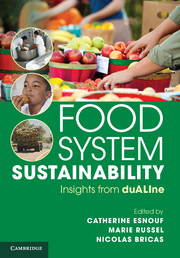Book contents
- Frontmatter
- Contents
- Foreword
- Acknowledgements
- Introduction
- 1 Context: new challenges for food systems
- 2 Consumption and consumers
- 3 Carbon footprint and nutritional quality of diets in France
- 4 Food systems
- 5 Industrial organisation and sustainability
- 6 Urbanisation and the sustainability of food systems
- 7 Losses and wastage
- 8 International trade, price volatility and standards for sustainability
- 9 Elements for a foresight debate on food sustainability
- 10 A critical panorama of methods used to assess food sustainability
- Conclusion
- References
- List of abbreviations
- List of duALIne experts
- Index
Introduction
Published online by Cambridge University Press: 05 April 2013
- Frontmatter
- Contents
- Foreword
- Acknowledgements
- Introduction
- 1 Context: new challenges for food systems
- 2 Consumption and consumers
- 3 Carbon footprint and nutritional quality of diets in France
- 4 Food systems
- 5 Industrial organisation and sustainability
- 6 Urbanisation and the sustainability of food systems
- 7 Losses and wastage
- 8 International trade, price volatility and standards for sustainability
- 9 Elements for a foresight debate on food sustainability
- 10 A critical panorama of methods used to assess food sustainability
- Conclusion
- References
- List of abbreviations
- List of duALIne experts
- Index
Summary
Food in the context of sustainable development
Food sustainability must meet the challenges of sustainable development. These challenges, of a political nature, are: (1) the transformation of technical and economic development methods to render them compatible with long-term environmental requirements, (2) intra-generational equity to provide the conditions for joint action to promote essential public goods at different territorial scales up to a planetary level, and (3) the acceptance by today’s generations of the costs, duties and limits determined with regard to the fate of future generations, even in the very long term (Godard, 2009). Food sustainability can be defined in this context, and has been assigned numerous definitions. The most recent was proposed by the FAO following a symposium on biodiversity: a sustainable food system will protect and respect biodiversity and ecosystems, be culturally acceptable, economically fair and affordable, nutritionally adequate, safe and healthy, while optimising the use of natural and human resources (FAO, 2010b).
The objective of food sustainability must be to face all or some of these challenges and not to assume that existing models continue to be applied in the long term; this may mean developing new models or adapting existing models.
- Type
- Chapter
- Information
- Food System SustainabilityInsights From duALIne, pp. 1 - 4Publisher: Cambridge University PressPrint publication year: 2013



